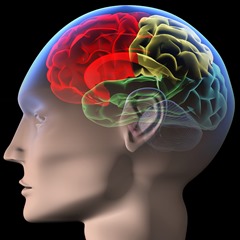 What does reading e-books do to your brain? It’s an interesting question. An article on Brit+Co ponders the issue of how our brains process device reading differently from print reading. You wouldn’t think that they ought to, would you? After all, words are words, aren’t they?
What does reading e-books do to your brain? It’s an interesting question. An article on Brit+Co ponders the issue of how our brains process device reading differently from print reading. You wouldn’t think that they ought to, would you? After all, words are words, aren’t they?
But it turns out that they do. And for all that some folks complain about missing out on “the smell of books,” it’s not all just aesthetics, either. The article cites a 2006 study on how people browse web sites that determines readers skim text on devices differently than on books. Books involve skimming in a T-shaped pattern—users read the first few lines completely and then go right down through the middle. However, when browsing the web, readers tend to browse in an F-shaped pattern—they read the first few lines completely then browse down the left margin from header to header.
It’s an interesting theory, but I wonder whether the article might not be conflating apples and oranges. Is it the reading medium that matters, or is it the format of the content? The study was made in 2006, which pre-dates the rise of the Kindle. Back in those days, only early-adopters were reading on e-ink. And the study focused on web pages, which are formatted entirely differently from fiction books. Novels don’t have headers, they just have body text. On the other hand, textbooks have plenty of headers, and I’m pretty sure I remember skim-reading them in much the same pattern this study ascribes to websites.
The article itself notes that people skim on paper books, too, but suggests they skim more when reading from devices. It doesn’t pay much attention to the differences between e-ink and LCD, either, save for citing a 2013 study showing that LCD screens lead to more visual fatigue. But e-ink device developers have done as much as they can to simulate the ink-on-paper reading experience—and when combined with the novel format, I’m skeptical that reading habits change quite as much as the article suggests. Even when reading a novel via an LCD device, why would you scan in an F-shaped pattern without headers?
It reminds me of the passage from Nick Bilton’s book I Live in the Future & Here’s How It Works in which he discusses the neuroscience of what the Internet is doing to our brains. Basically, learning to do anything changes our brains, because that’s how our brains work. You can’t conclude that something is bad just because it “changes our brains.” I touched on the same issue in a column last year in response to a not-terribly-well-supported scare piece by a neuroscientist who never published her work where it could be peer-reviewed.
In the end, I’m skeptical of the article’s claims that e-reading is necessarily changing the way we do read—and even if it is, it’s probably not a bad thing.
(Found via The Digital Reader.)






























